On Monday, I flagged Secretary of State Hillary Clinton’s remarks on Meet the Press, in which she declared that Iran “[does] not have the right to have the full enrichment and reprocessingcycle under [its] control.” That seemed to be the most expansive and, perhaps more significantly, the least vague pronouncement on the subject that I’d seen by an Obama administration official to date. Compare it, for instance, to Obama’s language in his Prague speech: We will support Iran’s right to peaceful nuclear energy with rigorousinspections. That’s a path that the Islamic Republic can take. Or thegovernment can choose increased isolation, […]
Middle East & North Africa Archive
Free Newsletter
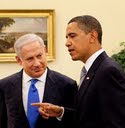
Few countries engage in internal debates with the passion and intensity that one finds in Israel. And no debate has engendered more intensity in Israel than the one over how to achieve peace with the Palestinians. Which makes it all the more striking that, today, Israelis have reached a quiet consensus on one key point: President Barack Obama needs to make some urgent changes to his Mideast push for peace. Just what exactly Obama should change is, of course, far from agreed. Washington may never satisfy the demands of Israelis on the extreme right who insist on keeping the West […]
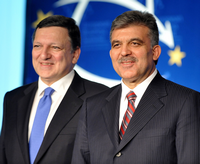
The release last week of a European Commission report highly critical of Bulgaria’s and Romania’s progress in their efforts against corruption serves as a useful reminder that both Brussels and Ankara should exercise patience while negotiating Turkey’s European Union bid. The Bulgarian and Romanian cases demonstrate that both Europe and its potential members are best served by an exhaustive, deliberate accession process. Negotiations between Turkey and the EU have slowed recently due to increasing doubts in both Turkey and Europe about the wisdom of further expansion. Already suffering from “enlargement fatigue,” Europe has seen the economic crisis highlight its internal […]
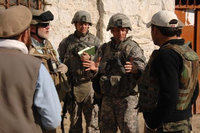
Last February, the office of the Special Inspector General for Iraq Reconstruction published a comprehensive 456-page historical analysis of the Iraq reconstruction experience entitled, “Hard Lessons.” The IG, Stuart Bowen — who was there from the beginning, assuming the post actually before the invasion — was kind enough to send me a copy this week. Having now read it, I must say it’s an incredible piece of data collection and analysis, even if, in my opinion, its concluding optimism about the U.S. government’s recent efforts to better prepare itself for the next “Iraq” — already upon us in the form […]
A friend pointed me in the direction of Secretary of State Hillary Clinton’s Meet the Press appearance yesterday (video here, transcript here). And I, like he, was suitably impressed by the tone and professionalism. I never gave in to the Hillary demonization during the primary campaign. As things turned out, we got what I think is a very competent president and secretary. I think, had she won, we would have gotten the same thing. That said, I only found one remark “significant,” in terms of both raising my eyebrows and adding an element to my thinking about the administration’s policies. […]
Six months after he ascended to the presidency of the United States, Barack Obama can point to a distinct new tone in American foreign policy and the start of a discernible makeover of the country’s image around the globe. When it comes to specific achievements in the international arena, however, the administration does not have much to show, so far. The transformation of America’s global standing had already started even before the president moved into his new Pennsylvania Avenue address on Jan. 20. Two factors triggered the process. First, Obama replaced a man who had become extraordinarily unpopular throughout most […]
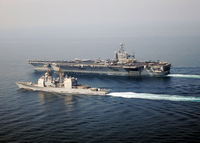
The aftermath of Iran’s June 12 presidential election — and in particular, the violent repression of opposition protests — has brought the Obama administration’s stated goal of engaging with the Iranian regime into question. Even if President Barack Obama decides to follow through with efforts to engage Tehran, many observers anticipate that the Iranian leadership will take an even tougher approach to negotiations over its nuclear program. The U.S. has not ruled out the possibility of military strikes to induce Iran to abandon its presumed goal of acquiring nuclear weapons, should diplomacy and sanctions fail. And a more recalcitrant Iranian […]
James Joyner’s got a provocative piece at the National Interest arguing that so far, President Barack Obama’s foreign policy reflects continuity with George W. Bush’s so-called “third term” (i.e., 2006-2008): There are strong signals that a real break will come on some secondaryissues. Obama is much less enthusiastic about missile defense, morelikely to show tough love to Israel and less apt to fervently pursueour half-century-old idiocy in Cuba. But on all the major issues, themovement has been cosmetic. Now, I’d argue that some of the secondary issues are not so secondary (Israel, for instance). I’d also argue that some of […]
For anyone who enters the site through the blog, I very strongly urge you to take a look at the new WPR feature issue, Back to the Future, that just went live today. It’s a really fascinating examination by three insightful foreign policy voices of the continued relevance of some tried-and-true, but nevertheless abandoned, foreign policy approaches from America’s recent history. Michael Cohen explains why the Powell Doctrine is more appropriate today than ever.Eugene Gholz examines how the Nixon Doctrine could be applied to address America’s current strategic challenges. And Robert Litwak discusses why Containment is as valid an approach […]
Lots of attention given to this initial Obama-Gates victory over Senate pork on the F-22. Less to the Gates announcement that the Army will temporarily add 22K troops over the next three fiscal years. For everyone keeping score at home, that’s on top of the 65K for the Army and 27K for the Marine Corps already budgeted for, which itself is on top of the transformation of the Army Reserve (205K) from a strategic reserve to an operational reserve. That’s a lot of extra boots that are, one imagines, meant to be put on the ground.Max Bergmann is a good […]
I didn’t see any major notice of this in the American press, but the Times (UK) reported last week that the director of Iran’s nuclear program, Gholam Reza Aghazadeh, resigned. Aghazadeh was a political ally of Mir Hossein Moussavi and also closely aligned with Ali Rafsanjani. More importantly, he was an able and effective administrator of Iran’s nuclear program for 12 years, leading the Times to speculate that his resignation was a setback for Iranian President Mahmoud Ahmadinejad. I initially had a less optimistic take, wondering whether his departure didn’t leave an opening for Ahmadinejad to fill with a hardliner. […]
In July 1969, President Richard Nixon dealt with Cold War triumph and adversity in quick succession. On July 24, he met the Apollo 11 astronauts on their return from the moon landing, a highly symbolic American victory in the space race. On the next day, at a press conference in Guam, he tried to adapt U.S. foreign policy to the pressures of the Vietnam War, which were stretching the military’s ability to meet America’s global commitments. He resisted calls to withdraw American ground forces from Vietnam immediately, and searched for a way to reinvigorate U.S. alliances around the world, hoping […]
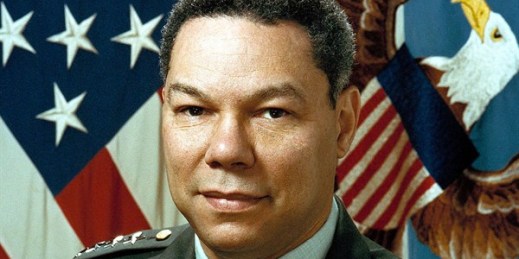
Editor’s note: The following article is one of 30 that we’ve selected from our archives to celebrate World Politics Review’s 15th anniversary. You can find the full collection here. Once upon a time, there was a grand and influential foreign policy doctrine. It was based on some traditional notions about U.S. statecraft that placed severe constraints on when America went to war. It asserted that when the United States used military force, it must do so in decisive fashion and only in the service of vital national interests.* For any military action, it counseled the dispassionate weighing of costs and benefits, […]
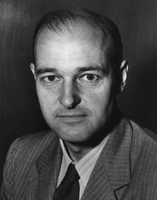
Upon taking office in January 2009, in addition to inheriting ongoing wars in Iraq and Afghanistan, President Barack Obama also inherited twin nuclear crises with North Korea and Iran. North Korea conducted its second nuclear test in May 2009, while Iran continues to flout U.N. Security Council resolutions requiring the suspension of its uranium enrichment program, which the United States and other countries believe is central to Tehran’s clandestine effort to acquire nuclear weapons. The nuclear crises are playing out against the backdrop of potentially significant societal developments in both countries. In North Korea, a stroke reportedly suffered by Kim […]

Last week’s much-anticipated Friday sermon by Akbar Hashemi Rafsanjani confirmed that the protests and resistance in Iran are no longer about the much-disputed June 12 presidential election. Despite post-election speculation on the prospects for a second Iranian revolution, the current situation more closely resembles a civil rights movement — one emerging organically from within the framework of the country’s constitution. In many respects, this mirrors the choice that increasingly emerged for Iranian voters in the final weeks of the election campaign, between a more pragmatic and measured approach — offered most visibly by Mir Hossein Moussavi — and the almost […]

Is the long-predicted decline of Political Islam about to occur? Several French scholars, such as Gilles Keppel and Olivier Roy, have been making this argument since the early 1990s. The only trouble was a subsequent string of Islamist electoral victories that seemed to undermine their thesis. But in light of Islamist losses in recent elections in Algeria, Jordan, Kuwait, Lebanon, and Bahrain, talk of the decline of Political Islam is reemerging. Influential Washington Post journalist David Ignatius recently wrote of a region-wide, anti-Islamist backlash whose central theme, according to a specialist he cited from the Carnegie Endowment for International Peace […]
